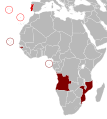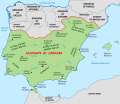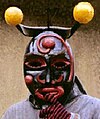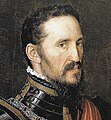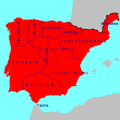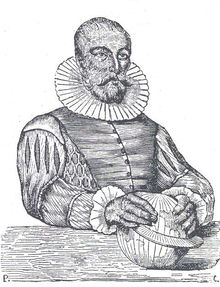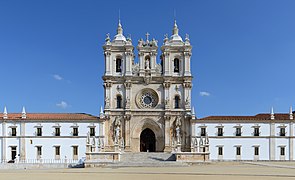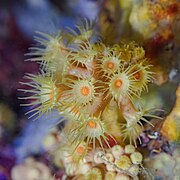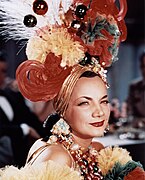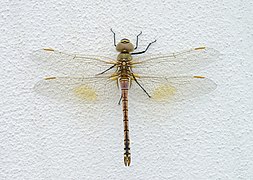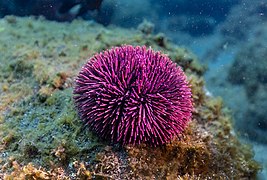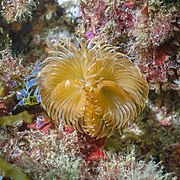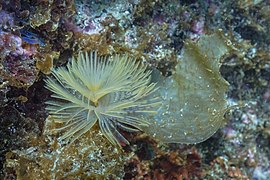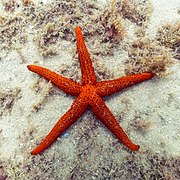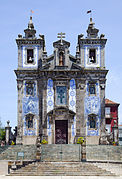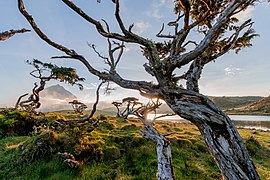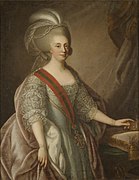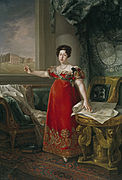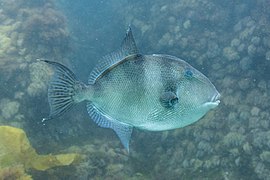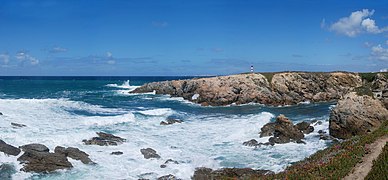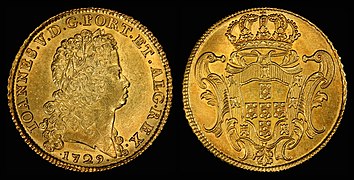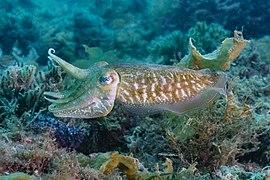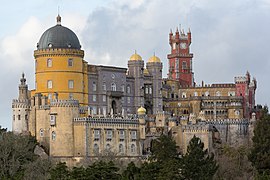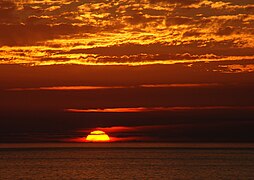Portal:Portugal
Welcome to the Portugal portal  Portugal, officially the Portuguese Republic, is a country located on the Iberian Peninsula, in Southwestern Europe, and whose territory also includes the Macaronesian archipelagos of the Azores and Madeira. It features the westernmost point in continental Europe, its mainland west and south border with the North Atlantic Ocean and in the north and east, the Portugal-Spain border constitutes the longest uninterrupted border-line in the European Union. Its archipelagos form two autonomous regions with their own regional governments. On the mainland, Alentejo region occupies the biggest area but is one of the least densely populated regions of Europe. Lisbon is the capital and largest city by population, being also the main spot for tourists alongside Porto and Algarve. One of the oldest countries in Europe, its territory has been continuously settled and fought over since prehistoric times. The territory was inhabited by the Celtic and Iberian peoples, such as the Lusitanians, the Gallaecians, the Celtici, Turduli, and the Conii. These peoples had some commercial and cultural contact with Phoenicians, ancient Greeks and Carthaginians. It was later ruled by the Romans, followed by the invasions of Germanic peoples together with the Alans, and later the Moors, who were eventually expelled during the Reconquista. First founded as a county within the Kingdom of León in 868, Portugal formally became an independent kingdom with the Treaty of Zamora in 1143. During the 15th and 16th centuries Portugal led the Age of Discovery and established one of the longest-lived maritime and commercial empires, becoming one of the main economic and political powers of the time. By the early 19th century, events such as the 1755 Lisbon earthquake, the country's occupation during the Napoleonic Wars, and the resulting independence of Brazil in 1822 led to a marked decay of Portugal's prior opulence. This was followed by the civil war between liberal constitutionalists and conservative absolutists over royal succession from 1828 to 1834. The 1910 revolution deposed Portugal's monarchy, and established the democratic but unstable Portuguese First Republic, later superseded by the authoritarian regimes of Ditadura Nacional (National Dictatorship) and Estado Novo (New State). Democracy was restored after the Carnation Revolution (1974), ending the Portuguese Colonial War and eventually losing its remaining colonial possessions. (Full article...) Selected article -The North Region (Portuguese: Região do Norte [ʁɨʒiˈɐ̃w du ˈnɔɾtɨ]) or Northern Portugal is the most populous region in Portugal, ahead of Lisbon, and the third most extensive by area. The region has 3,576,205 inhabitants according to the 2017 census, and its area is 21,278 kilometres (13,222 mi) with a density of 173 inhabitants per square kilometre. It is one of five regions of Mainland Portugal (NUTS II subdivisions). Its main population center is the urban area of Porto, with about one million inhabitants; it includes a larger political metropolitan region with 1.8 million, and an urban-metropolitan agglomeration with 2.99 million inhabitants, including Porto and neighboring cities, such as Braga, Guimarães and Póvoa de Varzim. The Commission of Regional Coordination of the North (CCDR-N) is the agency that coordinates environmental policies, land-use planning, cities and the overall development of this region, supporting local governments and associations. Northern Portugal is a culturally varied region. It is a land of dense vegetation and profound historic and cultural wealth. What is now Northern Portugal was first settled by various pre-Celtic and Celtic tribes before being visited by a number of Mediterranean civilizations who traded in its river-mouths, including Greek, Carthaginians, conquest by the Romans, invasion by Germanic peoples, and attacks by the Moors and the Vikings. (Full article...)This is a Featured article, which represents some of the best content on English Wikipedia.
The Madeira firecrest, Madeira kinglet, or Madeiracrest (Regulus madeirensis) is a very small passerine bird endemic to the island of Madeira. It is a member of the kinglet family. Before it was recognised as a separate species in 2003, it was classified as a subspecies of the common firecrest. It differs in appearance and vocalisations from its relative, and genetic analysis has confirmed it as a different species. The Madeiran bird has green upperparts, whitish underparts and two white wingbars, and a distinctive head pattern with a black eye stripe, short white supercilium, and a crest that is mainly orange in the male and yellow in the female. The female Madeira firecrest builds a spherical nest from cobwebs, moss and small twigs, and she incubates the eggs and broods the chicks on her own. Both parents feed the young. This species forages for insects and other small invertebrates in tree heath, laurisilva and other woodland. It is common within its restricted range, and is not considered to be threatened. (Full article...)General imagesThe following are images from various Portugal-related articles on Wikipedia.
Selected quote -"Dantas might know grammar, might know syntax, might know medicine, might know how to cook suppers for cardinals, he might know everything except how to write which is the only thing he does!"
O Dantas saberá gramática, saberá sintaxe, saberá medicina, saberá fazer ceias pra cardeais, saberá tudo menos escrever que é a única coisa que ele faz! Almada Negreiros, writer and painter This is a Good article, an article that meets a core set of high editorial standards.
Fernão Pires de Andrade (also spelled as Fernão Peres de Andrade; in contemporary sources, Fernam (Fernã) Perez Dandrade) (d. 1552) was a Portuguese merchant, pharmacist, and diplomat who worked under the explorer and colonial administrator Afonso de Albuquerque. His encounter with Ming China in 1517—after initial contacts by Jorge Álvares and Rafael Perestrello in 1513 and 1516, respectively—marked the resumption of direct European commercial and diplomatic contact with China. (Even though there were Europeans in Medieval China, notably Marco Polo, that period of contact had been interrupted by the fall of the Yuan dynasty.) Although de Andrade's mission was initially a success that allowed a Portuguese embassy to proceed all the way to Beijing, relations were soon spoiled by culminating events that led to an extremely negative impression of the Portuguese in China. This included acts of his brother Simão that enraged the Chinese, false reports of the Portuguese being cannibals of kidnapped Chinese children and true reports of their conquest of Malacca, a loyal Ming tributary state. Normalized trade and relations between Portugal and the Ming dynasty would not resume until the late 1540s and the 1557 establishment of Portuguese rule over Macau. (Full article...)Selected Biography -Pedro Nunes (Portuguese: [ˈpeðɾu ˈnunɨʃ]; Latin: Petrus Nonius; 1502 – 11 August 1578) was a Portuguese mathematician, cosmographer, and professor, probably from a New Christian (of Jewish origin) family. Considered one of the greatest mathematicians of his time, Nunes is best known for being the first to approach navigation and cartography with mathematical tools. Among other accomplishments, he was the first to propose the idea of a loxodrome, and was the inventor of several measuring devices, including the nonius (from which the Vernier scale was derived), named after his Latin surname. (Full article...)Selected picture - The battle of Aljubarrota took place on August 14, 1385, between Portuguese forces commanded by King John I of Portugal and his general Nuno Álvares Pereira, and the Castilian army of John I of Castile.
Did you know -
Portugal topicsPortugal lists
SubcategoriesRecognized content
Featured articles
Former featured articlesFeatured listsFormer featured listsGood articles
Former good articlesDid you know? articles
Featured pictures
Former featured portalsIn the News articles
Main page featured articles
Picture of the day pictures
Featured topicsNew articlesThis list was generated from these rules. Questions and feedback are always welcome! The search is being run daily with the most recent ~14 days of results. Note: Some articles may not be relevant to this project.
Rules | Match log | Results page (for watching) | Last updated: 2024-05-21 22:40 (UTC) Note: The list display can now be customized by each user. See List display personalization for details.
Things you can doRelated PortalsRelated WikiProjects
Associated WikimediaThe following Wikimedia Foundation sister projects provide more on this subject:
Discover Wikipedia using portals |













![Image 10Maios celebration in Madeira island [1] (from Culture of Portugal)](http://upload.wikimedia.org/wikipedia/commons/thumb/e/e1/2011-03-05_03-13_Madeira_045_Santana_%285543431418%29.jpg/120px-2011-03-05_03-13_Madeira_045_Santana_%285543431418%29.jpg)


